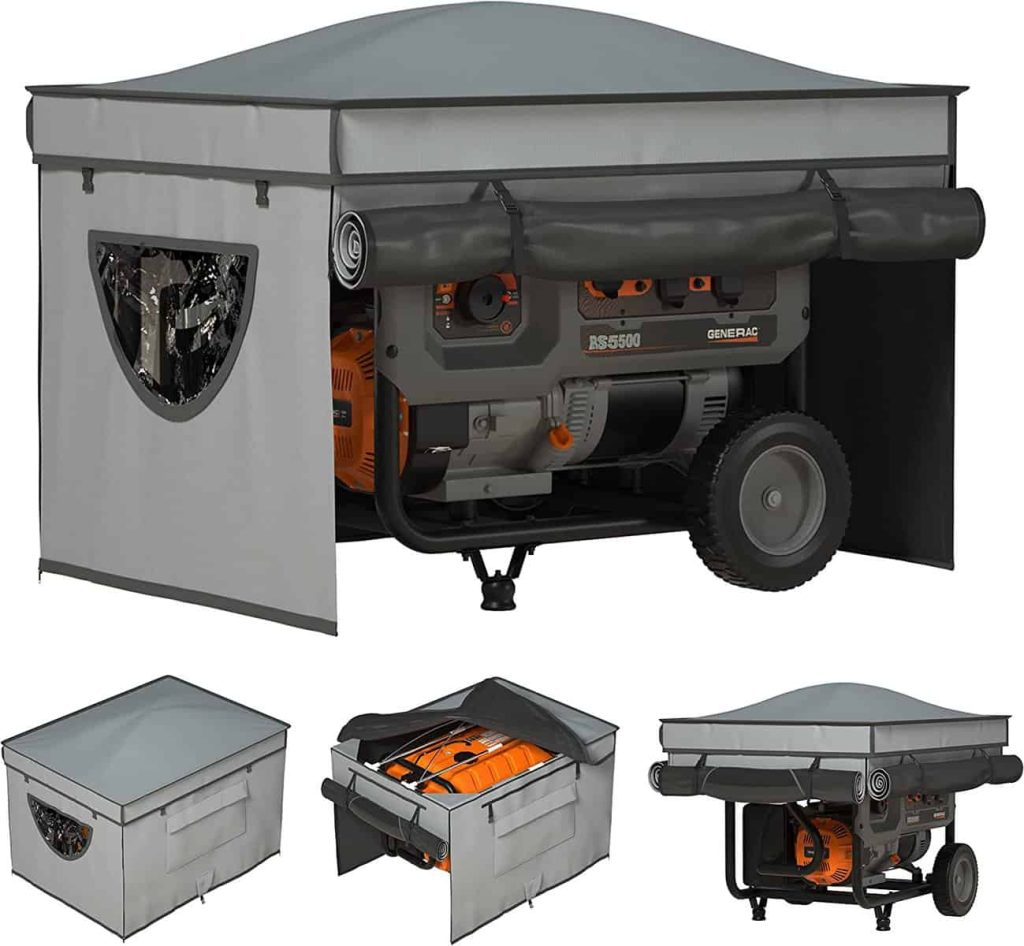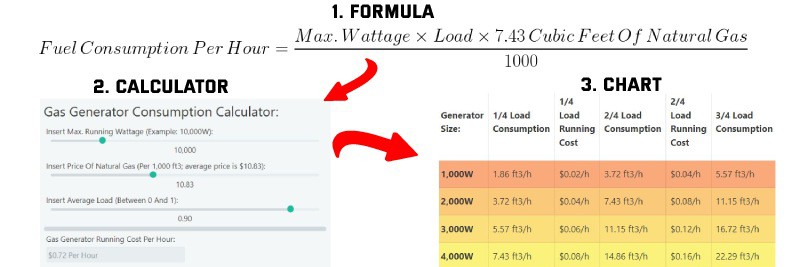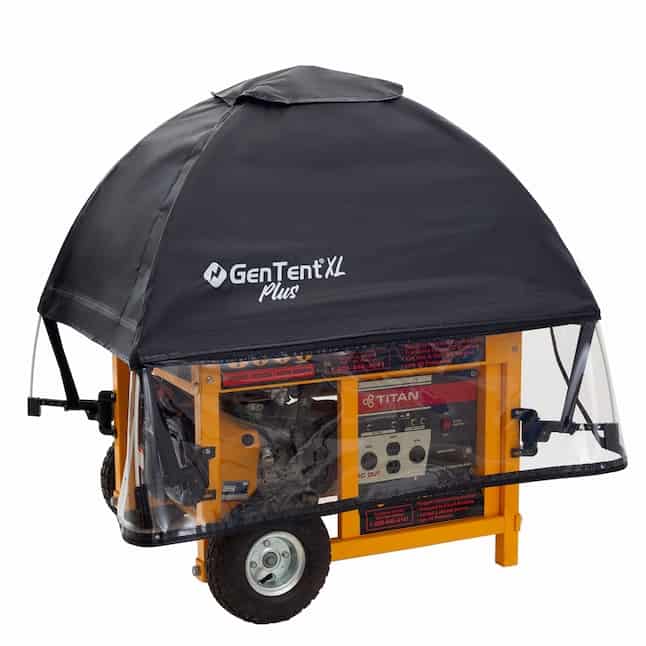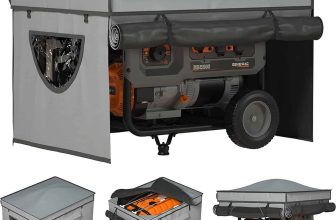Are you someone who depends on a portable generator for power? If so then its crucial that you know how to properly store this valuable equipment.
In doing so you can optimize its longevity and keep it running smoothly for years to come.
In this article we’ll share some top tips for storing your generator effectively and efficiently.
Generators are expensive investments that are widely used during blackouts or outdoor activities like camping trips. As such proper storage is key to making sure they stay in good shape and remain functional over time.
So whether you’re a seasoned generator owner or new to the game read on for our expert advice on ensuring your portable generator lasts as long as possible!

Cleaning And Inspecting The Generator
A reliable portable generator requires regular maintenance, including inspection and cleaning.
My preferred approach typically starts by wiping the device’s exterior with soapy water-ridden rags – this clears off accumulated dirt and dust particles which can damage or reduce performance output if left unaddressed.
Once done, I check all hoses and wires for any apparent signs of damage to prevent future issues—replacement follows immediately when such flaws come up.
Additionally, assessing the air filter cover for any debris keeping it from functioning correctly constitutes another critical step since it determines how efficiently your generator functions.
Finally yet importantly;inspecting internal components comes after ensuring everything on external parts looks good enough not to cause problems moving forward! As someone who holds a university degree maintaining my generator efficiently is something I am familiar with doing regularly.
This involves topping up with fresh oil whenever required and changing spark plugs when they become worn out or damaged; specific checks should be performed for other movable components as well in order to spot noticeable damages or indications of deterioration early on. In addition its important to ensure all connections are fastened tightly in order to avoid any unexpected malfunctions while using the generator. After completing each task on the checklist storing my generator inside would be the next step without hesitation.
Storing The Generator Indoors
Properly storing your portable generator indoors is an excellent way of getting more out of its lifespan while keeping you safe from potential hazards. With that said here are some tips on how best to store your portable generator indoors:
To start with make sure you’ve picked an appropriate location with plenty of ventilation which prevents toxic fumes from accumulating in your home – especially when running for extended periods of time.
Its equally important that there is nothing flammable around or close enough – like near windows/doors etc.. Also never forget about having a working carbon monoxide detector nearby just in case! The next step involves covering up your generator with a lightweight cloth or tarpaulin. This will keep dust/dirt away from critical engine components such as fan blades and prevent rust buildup over time. Just avoid using plastic covers as they can trap moisture inside and damage your generator.
Lastly fuel containers should always be stored separately in designated containers since they could be a huge fire hazard if any spills occur or leaks develop over time. Always handle fuel with extreme care to avoid accidental fires! Your decision to store a portable generator indoors requires certain precautions if you want maximum operational effectiveness. Here are some straightforward tips for achieving just that: start by selecting the appropriate type of fuel; then check regularly on how much gasoline is left- keeping it well above empty is important so as not risk decreased functionality or damage as a result of low levels or corrosion from moisture buildup. By implementing these measures routinely, ensuring seamless performance from your trusty machine isn’t hard work!
Using The Right Fuel Type
Fuel usage might not be the first thing on peoples minds when it comes to keeping their generators running smoothly – after all isn’t having a robust model sufficient? The answer lies in proper fuel selection and usage since choosing the wrong type can pose noteworthy risks like irreversible damages or even sudden equipment breakdowns.
That being said its vital to use the exact kind of fuel appropriate for your generator: gasoline engines require only gas while diesel models require only diesel – disregard these standards at your own peril! Failure to follow these guidelines can result in engine corrosion or other serious defects leading to expensive repairs or replacement costs down the line- something nobody wants!
One way of avoiding such trouble is by checking what kind of fuel you need before filling up every time: read through your manual carefully or consult with experts; better safe than sorry! Lastly remember not ever mix different types of fuels together as they might have unpredictable outcomes and create unwanted hazards both during storage and usage too.

Image Credit: rtpowersystems
Keeping The Generator Dry
Finding the perfect fuel type for your portable generator was undoubtedly an accomplishment worth celebrating. Now let’s focus on storage techniques; as keeping moisture away from your machine is essential for sustained performance and extended shelf life span.
Thankfully there are some simple yet effective measures at hand to help maintain optimum state effortlessly! Firstly remember- Keeping your generator out from dangerous elements (like rain or snow) play a crucial role in preventing any potential harm/damage caused by harsh environmental conditions
Covering it with a dedicated ‘generator cover’ (a specialized material designed explicitly for outdoor usage) provides additional protection against external elements while keeping internal parts safe from any harmful effects caused by dust or moisture accumulation over time.
This method ensures you’re ready to use your machine anytime without any difficulty, and it also simplifies cleaning procedures. So, use a cover that fits your generator appropriately to enjoy optimal performance while prolonging your machine’s lifespan.
Utilizing A Generator Cover
A well maintained generator is essential for its long term performance – something every owner should strive towards. A surefire way of achieving this is by investing in a good quality generator cover that keeps out dirt, debris and protects it from harsh weather conditions. You’ll be pleased to know that covers come in different sizes/materials too; so finding one that matches your needs won’t be difficult nor expensive!
Investing in an excellent quality cover doesn't just help keep your machine sparkling clean but provides an extra layer of protection against those harmful UV rays emitted by the sun too! This goes some way towards preventing any potential corrosion or wear on metal components - ultimately helping extend its useful life further still! Additionally using a suitable tent like covering offers added safeguarding from any water damage that could affect delicate electrical parts. Ignore giving such TLC (tender loving care) through using an appropriate cover at all costs if you don’t want unexpected repair costs – thats simply money down the drain. So why not play it safe be kind to your portable generator and do everything you can thanks to a weather resistant cover? As we delve into the topic of machine maintenance, it’s important to consider how maintaining proper oil levels can greatly enhance their longevity.

Image Credit: lowes
Maintaining Appropriate Oil Levels
Looking after your portable generator is essential for its smooth running and longevity. One key factor in this is making sure that you have sufficient lubrication within your engine via correct oil levels.
Neglecting to check these levels can lead to costly damages over time due to friction between parts.
To prevent this from happening, ensure that any top-up additions fall within recommendations given by manufacturers or refer back to user manuals or authorized service centers for guidance.
It is beneficial for optimal performance and longevity purposes that you change the oil at least once annually- more frequently if intensive usage demands as oils naturally break down over time compromising effectiveness . Setting reminders on a personal calendar will help keep maintenance tasks front-of-mind, avoiding any lapses in upkeep.
Caring correctly now will mean cost-saving benefits later!
Disconnecting The Battery
As a portable generator owner one thing you don’t want to overlook is proper storage procedures for safeguarding your machines longevity. One crucial element in achieving this goal is disconnecting the battery- an essential step in maintaining peak performance while also protecting yourself from electrical hazards.
Disconnecting your generators battery during storage can be a simple task: first turn off all power sources before unplugging any appliances linked with the machine. Once these steps are complete use a wrench tool to remove the negative cable from its frame- be sure to carry out this step before taking on any additional maintenance work or storing procedures. Finally give the terminals a quick wipe down before reattaching them later on. To prevent overloading issues when using your generator regularly requires more effort than merely disconnecting cables: it necessitates careful planning beforehand as an essential aspect of preserving maximum efficiency levels and prolonging its lifespan.
Avoiding Overloading The Generator
To operate a generator successfully one must understand its load capacity well. Ignorance on this matter may lead to severe damage and considerably reduce the devices lifespan causing one a lot of trouble! As a safe bet never exceed more than 80% of your portable generators load capacity. Different types of generators have different capacities; hence it is essential knowing yours before plugging in any appliances or devices at home or worksite.
Always counter check each utilitys wattage ratings to ensure they don’t surpass the set energy limit for your machine. With these guidelines in mind you can operate your power source with confidence without worrying about any accidents related to overloading and damaging anything around you. But remember also what keeps machines working at their best: avoiding exposure to high heat sources!

Image Credit: carelabz
Keeping The Generator Away From Heat Sources
It goes without saying that if you want your trusty generator by your side for many years to come it pays dividends to look after it properly. One of the most crucial things when it comes to maintaining its longevity is avoiding overloading it at all costs – but there are other factors too which could put a spanner in the works.
One such factor is heat.
Without proper care and attention exposure to excessive levels of heat could prematurely age the various components of your vital piece of equipment. To avoid this happening always ensure that you store your generator far away from anything hot – so say goodbye to storing it next to radiators and fireplaces! Additionally try and locate it in an area with good airflow so any unnecessary heat can easily disperse. Another area where vigilance pays off is around cooking appliances like ovens and stovetops – be sure not place them too close together or else excess heat could build up with potentially disastrous consequences.
By sticking to these precautions and regularly inspecting the cooling system for any issues that could cause overheating your generator will continue to work like a dream for many years to come.Regularly Checking The Cooling System
If you want your portable generator unit to last longer and run smoother than ever proper storage practices coupled with regular maintenance checks are highly recommended- especially when concerned with the cooling system. Frequent inspections here will enable you to detect any potential issues early on before they turn into expensive problems that require full on repairs or replacements – something that could have been entirely avoidable if detected sooner.
To begin this process check first examine coolant levels after ensuring that both engine and machine are completely turned off and cooled down.
Then carefully open up your radiator cap while keeping a close eye out for any unusual smells or discolorations- should there be any observation of this kind; bring in professional help right away.
Finally don’t forget about all those little details like checking hoses and connections related within the cooling system- they may seem insignificant at first glance but could result in much bigger problems down the road if overlooked for too long. Its best practice to carry out proactive checks here too by inspecting these components every few months routinely.
Frequently Asked Questions
How Often Should I Clean And Inspect The Generator?
Ensuring optimal performance from your generator involves routine cleaning and inspection efforts. The frequency at which you should carry out these tasks hinges on the amount of usage; however experts recommend scheduling them at least once every three months.
During the assessment phase be vigilant for any telltale signs of wear or damage incurred since your previous clean up exercise.
Furthermore don’t overlook removing dirt and debris accumulation as this can negatively impact its efficiency levels. Sticking to this regimen will guarantee both safety and long lasting durability for your valuable asset.
Is It Okay To Use The Generator Indoors?
Under no circumstance should generators be used inside as they present serious safety hazards.
Indoor use may result in significant release of poisonous carbon monoxide gas since these machines are constructed solely for outdoor usage purposes only.
Additionally the loud noises they produce can negatively affect both you and your neighbors’ peace; therefore storing them outdoors is preferable.
Appropriate ventilation must be maintained when using it outdoors while also making sure there are no openings nearby through which exhaust fumes may enter.
How Often Should I Check The Oil Levels?
As any seasoned portable-generator user would tell you – checking your machine’s oil level frequently ranks high on their maintenance checklist! Sounds like too much work? Not really if you are looking out for long-lasting smooth operation always!
Make it a point to check the oil level before each usage as well as whenever storing for prolonged periods (few weeks).
Dark or cloudy-looking fluid signals the need for an immediate replacement.
Moreover, at 100 hours use mark/yearly interval- whichever meets first- replacing used-up engine-oil with fresh supplies should be a non-negotiable task to maintain your generator’s highest efficiency!
Can I Leave The Battery Connected While Storing The Generator?
To get long-term use out of your generator while keeping up its performance standards requires some maintenance practices when storing equipment.
Although leaving the battery connected while stored might seem like a convenient choice initially; ultimately, this alternative doesn’t offer benefits over disconnecting batteries during storage periods.
To ensure maximum efficiency throughout its lifespan; It is advisable practice instead of pulling out batteries from generators than keeping them attached without usage for prolonged periods may result in discharging them completely or contributing towards internal corrosion issues due exposure towards moisture or environmental factors causing irreversible damage.
If unable or unwillingly unable to pursue removing batteries during storage periods; we suggest regularly checking on their conditions periodically – this will help prevent any complications related from unnecessary discharge while ensuring optimal usage.
Is There A Maximum Number Of Hours I Should Run The Generator At A Time?
To ensure that your generator functions smoothly and safely over an extended period its essential to use it responsibly with proper consideration given towards total runtime.
While there isn’t an exact figure when it comes to maximum usage time for generators experts generally recommend keeping sessions within the range of 8 10 hours per day wherever possible.
For example if you need power overnight for multiple days in a row; consider dividing operations into two separate runs lasting roughly half the night each (about 4 5 hour increments).
Doing so helps mitigate wear and tear on parts and prevents overheating which can take its toll on performance in the long term.
Conclusion
Giving special attention to the storage of your portable generator is vital in maintaining optimal performance levels over time. Regular maintenance routines include inspections and cleaning procedures while monitoring oil levels plays a crucial role in extending its lifespan effectively.
Remember that using generators indoors carries inherent risks; hence it’s better to stick with outdoor deployment options only. Disconnecting the battery while idle also helps prevent damage caused by corrosion or power leakage issues during long periods of non-use.
Additionally, keeping usage durations within limits of eight hours at most helps ensure that important parts remain operational throughout its lifespan.
Image Credit: bnproducts





